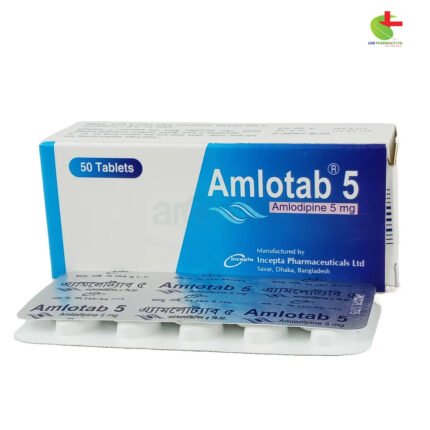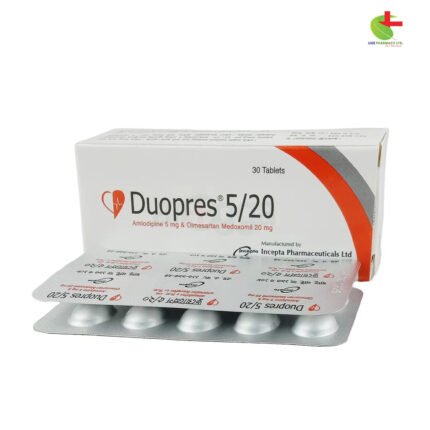Fixocard 25
60.00৳ Strip
- Offers a powerful fixed-dose combination of Amlodipine and Atenolol.
- Effectively manages essential hypertension and angina pectoris.
- Dual-action formula lowers blood pressure and reduces cardiac workload.
- Consult a healthcare professional for personalized advice and dosage recommendations.
- Take charge of your cardiovascular health.
 Brand
Brand
|
Incepta Pharmaceuticals Ltd |
|---|---|
 Generics
Generics
|
Amlodipine Besilate + Atenolol |
 Type
Type
|
Tablet |
Indications
This medication is recommended for:
- Individuals with essential hypertension
- Patients experiencing angina pectoris alongside hypertension
- Those recovering from a myocardial infarction (MI)
- Patients with refractory angina pectoris unresponsive to nitrate therapy
Always follow the advice of a registered healthcare professional when taking medication.
Pharmacology
This product is a fixed-dose combination of Amlodipine and Atenolol.
Amlodipine is a dihydropyridine calcium channel blocker that restricts the entry of calcium ions into vascular and cardiac smooth muscle. It primarily targets vascular smooth muscle, acting as a peripheral vasodilator to lower peripheral vascular resistance and reduce blood pressure. Amlodipine helps alleviate coronary vasoreactivity and decreases cardiac workload by reducing afterload.
Atenolol is a cardioselective beta-blocker, with its selectivity varying by dosage. It lowers blood pressure by reducing cardiac output, diminishing plasma renin activity, and decreasing sympathetic outflow from the central nervous system. Additionally, Atenolol lowers myocardial oxygen demand through its negative inotropic and chronotropic effects.
Dosage & Administration
The typical dosage is one Amlodipine and Atenolol 5/25 mg tablet taken once daily. If required, the dosage may be increased to two 5/25 mg tablets daily or adjusted as per a physician’s guidance. Individual dosage adjustments may be necessary.
Always consult a registered healthcare professional for medication guidance.
Interactions
- Disopyramide: Atenolol may decrease disopyramide clearance by 20%, potentially increasing negative inotropic effects on the heart.
- Ampicillin: Doses of 1 gm or higher may lower Atenolol levels.
- Oral Antidiabetics and Insulin: Beta-blockers can reduce tissue sensitivity to insulin and may hinder insulin secretion. Atenolol has a lower risk of these effects.
Contraindications
This medication should not be used by individuals with:
- Hypersensitivity to either component
- Sinus bradycardia
- Second or higher-degree heart block
- Cardiogenic shock
- Hypotension
- Congestive heart failure
- Impaired left ventricular function
Side Effects
The Amlodipine and Atenolol combination is generally well tolerated. Potential side effects may include fatigue, headache, edema, nausea, drowsiness, anxiety, and depression.
Pregnancy & Lactation
Use during pregnancy is advised only if the benefits outweigh potential risks to the fetus. Nursing mothers should avoid this combination. If deemed necessary, breastfeeding should be discontinued.
Precautions & Warnings
- Bronchospasm: Caution is advised for patients with airway obstruction.
- Renal Impairment: This medication can be used in individuals with renal impairment, but caution is necessary if creatinine clearance is below 30 ml/min, as Atenolol excretion may be affected.
- Hepatic Impairment: Use with caution in patients with severe liver damage, as this may prolong Amlodipine’s elimination half-life.
- Drug Withdrawal: Patients should be informed about the risks of sudden discontinuation, especially those with coronary heart disease. Any cessation should be gradual and monitored.
Overdose Effects
While not frequently reported, overdose may lead to hypotension and, in rarer cases, congestive heart failure. Unabsorbed medication may be removed via gastric lavage or activated charcoal. Symptomatic treatment is recommended.
Therapeutic Class
Combined antihypertensive agents
Storage Conditions
Store below 30°C, away from light and moisture. Keep out of reach of children.













Reviews
There are no reviews yet.